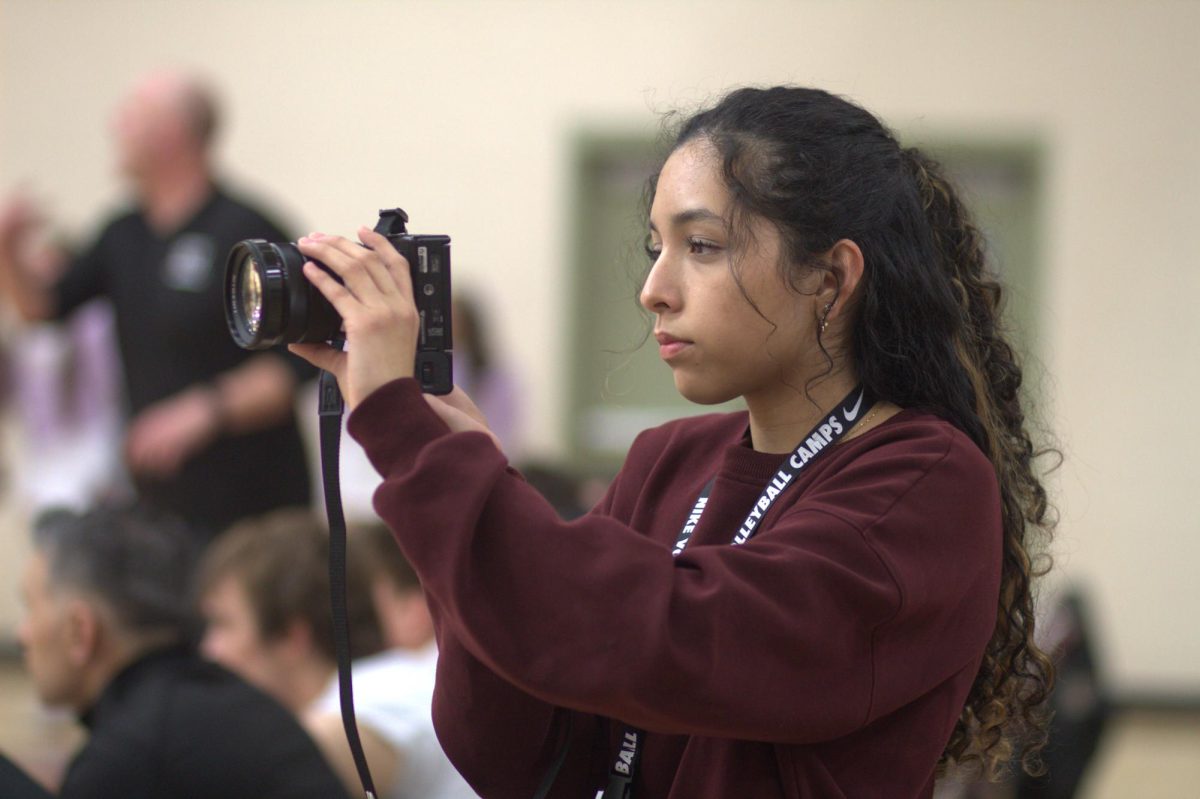Junior Lina Tran flips through her Pre-Calculus textbook. Photo by ILAF ESUF
Out with the old and in with the new may be a good motto for schools to follow. After years of wear and tear, some school textbooks are outdated and ready to be sold to a used book distributor. Although textbooks get updated regularly, the staff here only files for new textbooks if they are absolutely necessary.
“I think that the district is placing a greater priority on this issue now and creating a system for renewal that is fair and sustainable. However, the teachers in this district do a great job with the tools they have on hand. That might delay textbook orders because the need may not be as apparent,” AP World and geography teacher Mr. Jon Bryant said.
Complaints from students or suggestions from other teachers are common indicators to buy new books. If teachers do feel the need to purchase new textbooks, they have to contact publishers for book samples, and if it’s a new book, they must obtain approval from the school board by completing the proper paperwork that is sent to the district office. Teachers meet with their colleagues at Rocklin High School to agree on the books. According to science department chair Mrs. Penny Shelton, both Whitney and Rocklin campuses must agree on the textbook being used as requested by the district.
The fiscal aspect of buying new textbooks raises heavy concern; however, teachers do not have to worry about raising money for books. The district already has a portion of the budget allocated to buying these materials. Currently, the Rocklin Unified School District spends around $2.3 million (which is 3 percent of the general budget) on books and school supplies. Of that large sum, less than $500,000 are spent on textbooks. If multiple departments would like to purchase textbooks at the same time, the district prioritizes the needs based on the department’s reasoning for requesting new textbooks.
Each department is asked to make justifications for why they would like new textbooks which will discuss what the old text lacked, how well the new book aligns with the California standards, benefits of the new text in terms of how it will support student learning and other educational factors. If the school board agrees with the justifications made, they will approve the request. Sometimes it can take years for a department’s request for new textbooks to be approved.
“Last year (AP) World History had requested a new text for two years and had a need for a book that was more aligned to the AP test and more accessible to students. The two AP World History teachers from both high schools made a convincing case for a new book. Other departments had a need and a good reason but after discussing the need with the department chairs, AP World at both sites received the requested books. Since we have a limited amount of money and textbooks are very expensive, choices have to be made. Once a request has been prepared, that request stays on the list and is moved closer to the top of the list for the next year’s round of requests. We revisit new and old needs annually,” principal Mrs. Debra Hawkins said.
In most students’ opinions, the lengthy battle to get new textbooks is worth it since it has a profound impact on student performances. Understanding the perils of boring textbooks, teachers are constantly trying to use different methods to educate students; thus saving money and adding interest to the class.
“History itself can be a little bland to read straight from a book. The pictures and Primary Source Documents (used in class) are a nice brain break from all of the facts and dates,” sophomore Nora Rabah said.
Some students also use the Internet as a learning tool. As technology changes, it is likely that more students will walk around campus with e-books and access materials online, however, it is uncertain when these changes will occur.
“In the future, it would be great if we could afford to have online books and every student has a book reader of some sort to access these books. We could save paper, library space, back aches from backpacks and so much more,” principal Mrs. Debra Hawkins said.
“From the educational literature I have read, the textbook companies are geared up and ready to go with this plan. The problem is obviously accessibility for all students and affordability for schools. Schools will need to have more Wi-Fi availability and everyone must have technology at their fingertips. As fast as technology is moving, the use of online everything let alone textbooks should not be very far down the road. I can see huge advantages for online texts. As a former English teacher, I know my students would have really enjoyed doing their annotations in novels in an online format — no more sticky notes on the pages.”
Although the switch to online based textbooks seems one step closer, for now students will have to deal with flipping pages and avoiding the temptation to write snarky comments on their 500 pages of doom.
By ILAF ESUF





